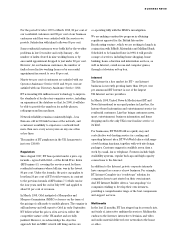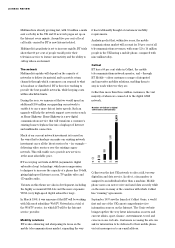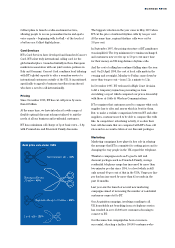BT 1998 Annual Report Download - page 19
Download and view the complete annual report
Please find page 19 of the 1998 BT annual report below. You can navigate through the pages in the report by either clicking on the pages listed below, or by using the keyword search tool below to find specific information within the annual report.F I N A N C I A L R E V I E
acquired subsidiaries, offset by savings resulting from
staff reductions.
The depreciation charge increased by 5.7% in the 1998
financial year to £2,395 million after increasing by 3.5%
in the 1997 financial year, reflecting BT’s continuing high
level of investment in its networks.
Payments to other telecommunication operators grew
by 8.4% in the 1998 financial year to £1,600 million after
increasing by 6.7% in the 1997 financial year, primarily as a
result of the growing number of calls terminating on UK
competitors’ networks. Payments to overseas operators for
incoming calls terminating in the UK fell significantly
in both years as a consequence of falling prices and the
strengthening of sterling more than offsetting call
volume growth.
Other operating costs, which rose by 10.5% in the 1998
financial year to £4,761 million and by 2.8% in the 1997
financial year, include the maintenance and support of the
networks, accommodation and marketing costs, the costs
of BT’s overseas operations and the cost of sales of
customer premises equipment. In the UK’s increasingly
competitive telecommunications market, BT is spending
significantly more on its marketing programmes, including
extensive TV advertising, and this has been one of the
three main factors behind the increase in costs. The others
have been the costs incurred in supporting the recent
rapid expansion of Cellnet and Concert.
Redundancy costs of £106 million were incurred in the
1998 financial year, compared with £367 million in the
1997 financial year and £421 million in the 1996 financial
year. The significant reduction in costs in the 1998 financial
year is a consequence of a surplus arising in BT’s main
pension scheme. In view of this surplus, described below,
and in accordance with BT’s accounting policies,
redundancy charges for the 1998 financial year do not
include the costs of the incremental pension benefits
provided to early retirees. In the 1997 and 1996 financial
years, redundancy costs included £258 million and
£266 million relating to incremental pension benefits,
respectively.
Operating profit
Operating profit for the 1998 financial year of £3,657 million
was £412 million (12.7%) higher than in the previous year.
In the 1997 financial year, operating profit was 4.7% higher
than in the 1996 financial year.
Associates
As a consequence of the termination of the BT/MCI
merger agreement and BT’s agreement with WorldCom to
vote in favour of the proposed MCI/WorldCom merger, BT
ceased treating MCI as an associate from 1 November 1997.
The group’s share of its associates’ results for the 1998
financial year incorporates a loss of £27 million,
representing BT’s share of MCI’s results up to that date,
which include a special charge of £63 million.
Excluding MCI, the group’s share of losses of associates
totalled £225 million in the 1998 financial year. The principal
loss arose in Viag Interkom which is building its initial
network to compete in the German market. Smaller losses
were incurred by Telfort in the Netherlands and Cegetel in
France, which has been an associate since September 1997.
The group’s £139 million share of profits of associated
undertakings in the 1997 financial year consisted primarily
of the company’s share of MCI’s profits less BT’s share of
losses in its joint ventures in Germany and Sweden which
were commencing establishing their businesses. BT’s share
of MCI’s pre-tax profit for the 1997 financial year amounted
to £175 million, under BT’s accounting policies, and was
significantly higher than the cor responding figure of
£101 million for the 1996 financial year which had been
adversely affected by a restructuring charge, BT’s share
of which was £73 million.
BT expects that its associates in Europe as a whole
will continue to incur losses for the next two to three
financial years.
Interest charge and bond repurchase premium
Following payment of the special dividend in
September 1997, described below, the group’s borrowings
have increased significantly and its interest charge has
risen commensurately. Consequently, in the 1998 financial
year, the group’s net interest charge of £249 million was
£120 million higher than the interest charge in the
previous year. Interest cover represents 14.7 times
operating profit and is expected to continue at a
comfortable level.
The net interest charge of £129 million for the 1997
financial year was £41 million lower than the interest charge
in the 1996 financial year. The group’s strong positive cash
flow was the main contributor to this lower charge which
was covered 25.2 times by operating profit.
























